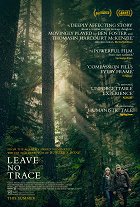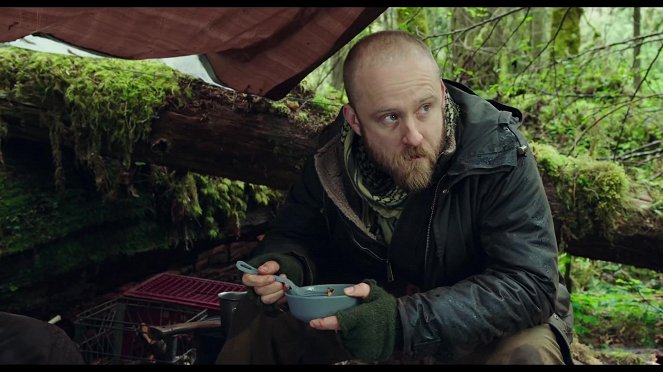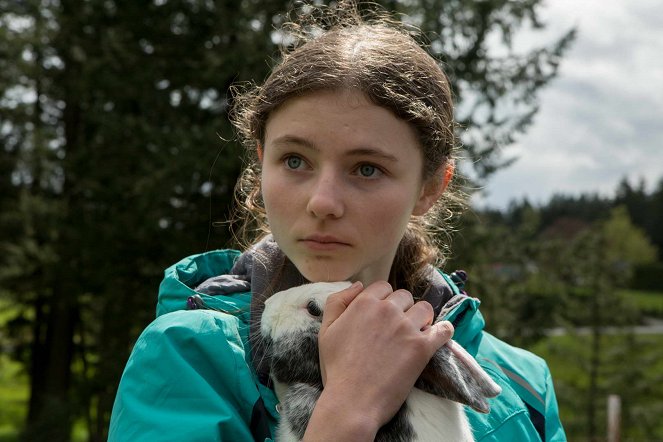Director:
Debra GranikCámara:
Michael McDonoughMúsica:
Dickon HinchliffeReparto:
Ben Foster, Thomasin McKenzie, Jeff Kober, Dale Dickey, Isaiah Stone, Michael Draper, Dana Millican, Ayanna Berkshire, Spencer S. Hanley, Marisa AndersonStreaming (1)
Sinopsis(1)
Will (Ben Foster) and his teenage daughter, Tom (Thomasin Harcourt McKenzie), have lived off the grid for years in the forests of Portland, Oregon. When their idyllic life is shattered, both are put into social services. After clashing with their new surroundings, Will and Tom set off on a harrowing journey back to their wild homeland. The film is directed by Debra Granik from a script adapted by Granik and Anne Rosellini. (Bleecker Street Media)
(más)Videos (1)
Reseñas (5)
Se puede comparar con Captain Fantastic, que se rodó con otro humor, sobre todo con un talante más divertido y lúdico. Hay que decir que No dejes rastro es realmente largo en algunas partes, aunque ciertamente no es aburrido. Se eche en falta una trama más significativa. Así que la película va de una cosa a otra a su propio ritmo y se diluye bastante rápido hacia el final. Pero me quito el sombrero ante Thomasin McKenzie por haber asumido el papel principal con tanta perspicacia y pasión. Ben Foster solo puede secundar eso. [KVIFF 2018]
()
Padre e hija evitan la sociedad, intentan vivir en el bosque, etc. ¿Es correcto que no la incluya en la sociedad, sin darle otra educación que la suya? ¿Y cuánto durará el fuerte vínculo familiar, en el que solo se tienen a sí mismos? Una bonita película de relaciones que percibe la sociedad desde el otro lado, pero que no critica ninguno de los dos mundos. Casi sin dramatizar, con un ritmo narrativo tranquilo. Con menos personajes y sin el colorido de una película parecida, Captain Fantastic. [Cannes]
()
A bit of a tramping drama in the vein of Captain Fantastic about a dad and his daughter who live in a natural way and try to become one with nature. This doesn’t go over well with people who live orthodox lives and don’t understand and condemn everything but the established norm. The Americans are terrible puritans in this regard, but in here (Czech Republic) this movie has to warm the heart of every tramp. I liked it too and I’m not even a tramp. Here in the Czech Republic, we are probably more benevolent than the people in the USA. The second half of the movie and the moments in the community with the uncle, who played American tramp songs, were really nice, radiating a feeling of well-being and freedom; just like the ending itself, which was flawless Ben Foster engraved himself into my memory thanks to this role and I am looking forward to seeing him in Medieval.
()
Soon after Lazzaro Felice comes another film, at the end of which I had the desire to escape into the wilderness and spend the rest of my life among wolves. Although these films are fundamentally different, Leave No Trace is, for example, far more intuitive, as events simply follow one another in a time-lapse documentary without being exposed in advance (conversely, the entire first half of Lazzaro Felice is preparation for the second half), the plot flows freely and undramatically, we are not made aware of some essential information, the narrative does not come back to many of the characters and situations (for example, the only thing that we learn about the mother is that she liked the colour yellow). The protagonists have to overcome obstacles mainly in order to get to know each other and themselves better, rather than to achieve a particular objective. Upon closer viewing, it is possible to uncover in Leave No Trace, like in Lazzaro Felice, a web of motifs connected with the theme of man’s relationship to his own nature. Both pictures turn our attention (back) to nature (and to that which is generally good and unspoiled), or rather it compels us to think about man’s relationship to nature. I think these films are more successful in this regard than are “pure” nature documentaries, to which it is more difficult to connect emotionally due to the absence of a human element. In Leave No Trace, this is aided by the fact that the film does not contain a single negative character. It is purely a clash between the system (towards which Granik is not explicitly critical) and people who want (need) to live outside of it. We understand their situation, but we are not didactically guided to accept the opinion that Walden’s way of existence is the only correct way. In a similarly ambivalent manner, the film addresses the issue of freedom. Though civilisation establishes binding norms (connected here with Christmas trees, which must all look perfect) and tries to somehow categorise everyone (as Tom places shirts in drawers in a new house), but the main female protagonist is in the forests under the ceaseless patronage of her father and cannot rely on basic life security. For better or worse, they are reminiscent of a pair of seahorses, brought to mind by a girl's pendant or an orange peel reminiscent of that animal, which mates for life and whose offspring develop in the abdominal sack of the male, rather than that of the female. Giving someone freedom can be the greatest expression of love. Though the film raises the visibility of certain issues through its story, it leaves it to us to decide what is better. Will provides similar freedom in raising his daughter. He does not lead her to accept a single dogmatic worldview (he responds with a smile rather than disapprovingly to her remark that God created frogs, as she had read in a leaflet distributed by the local Christian community), but he stimulates her curiosity. Thanks to this freedom that the film gives us, the opinion at which we arrive has even greater weight. Leave No Trace thus continues to reverberate after the disarming, maximally simple penultimate scene. 85%
()
(menos)
(más)
Almost all my life I've had the same approach to nature as the main characters in the film, so I was happy to be guided by them through the forest corners of the state of Oregon. If I were more courageous, I would definitely go to join them, because I increasingly see modern civilization as a necessary evil. American independent filmmaker Debra Granik tells an extremely powerful story full of a strange, wistful poetry that leaves a nostalgic feeling in the soul. Although I think I understood the mindset and motives of both the father and the daughter, I'm still a little disappointed that there remained more questions than answers at the end. (75%)
()



Anuncio